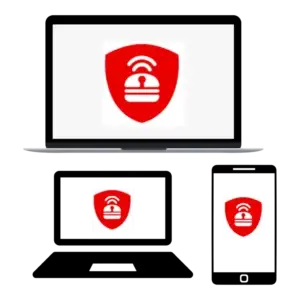Are you tired of being tracked online? Want to keep your internet activities private and secure? Then say hello to residential VPNs!
These virtual private networks use IP addresses associated with real homes, making it almost impossible for anyone to trace your online activities.
In this blog, we will explore what a residential VPN is, how it differs from datacenter VPNs, its pros and cons, and even some Reddit opinions on the matter (because who doesn’t love some good ol’ Reddit drama?).
We’ll also answer some common questions, like “Are residential VPNs legal?” and show you how to get a residential IP address. So, buckle up and get ready for a wild ride through the world of residential VPNs—it’s gonna be a hoot!
Residential VPN: The Ultimate Guide to Online Security
What is a Residential VPN?
A Residential VPN is a virtual private network that uses an IP address associated with a physical residential location, providing higher levels of privacy and security than commercial VPNs. They are useful for accessing geo-restricted content and evading internet censorship and can be utilized for both personal and business purposes.
Residential VPNs vs. Datacenter VPNs
Let’s talk about the differences between Residential and Datacenter VPNs. Unlike Datacenter VPNs that use virtual servers for IPs, a Residential VPN uses an IP address provided by an Internet Service Provider (ISP).
The former offers faster speed and unlimited bandwidth, whereas the latter is less likely to have websites block it. Also, it offers better anonymity with high military-grade encryption that secures user personal information and online activities from ISPs or DNS leaks.
You can also easily access streaming services such as Netflix or BBC iPlayer using a Residential VPN service. Residential VPNs are particularly useful for individuals who want to access streaming services or websites that are blocked in their region. At the same time, Data centers are more suitable for businesses that require high-speed and secure connections for their operations.
Differences Between Residential Proxies and VPNs
Would you rather use residential proxies or VPNs to access the internet anonymously? While residential proxies use IP addresses provided by internet service providers, VPNs have their own servers.
The former is generally used for web scraping and data mining, while the latter is ideal for general online privacy and security. Additionally, residential proxies can be more expensive than VPN services but offer better performance and reliability when it comes to accessing content without revealing your true location.
Are There Any Drawbacks to Using a Residential VPN?
As with any technology, there are potential drawbacks to using a Residential VPN. One of the main worries is that some websites can easily identify and block residential IPs. Also, these VPNs may have a limited number of servers when compared to Datacenter VPNs, which can result in slower speeds or connection issues during peak usage periods.
However, if you choose a reputable provider with a large network, then these issues can be minimized. It is essential to do your research and select a reliable Residential VPN service that meets your needs.
Reddit’s Opinions on Residential VPNs
According to numerous Reddit discussions, residential VPNs are highly recommended for privacy-conscious individuals. Redditors praise their ability to easily bypass geo-restrictions and access streaming services such as Netflix.
However, some users have reported slower internet speeds when using a residential VPN than data center VPNs. Overall, the consensus seems to be that residential VPNs are a reliable option for online security and anonymity.
How to Get a Residential IP Address
Getting a residential IP address involves subscribing to a reputable VPN service that provides this feature. Look for VPN providers specializing in residential IPs with a large pool of IP addresses to choose from. Some providers offer free trials or money-back guarantees, so you can test their service before committing.
Make sure to thoroughly research the provider’s reputation and customer reviews to ensure you’re getting a reliable service. Once you’ve subscribed, connect to the VPN server with the desired location to obtain a residential IP address.
Are Residential VPNs Legal?
Yes, using a residential VPN is legal in most countries. However, it’s essential to note that while a VPN can provide privacy and security online, it shouldn’t be used for illegal activities.
It’s always important to check your local laws and regulations regarding the use of VPNs. In general, as long as you’re not engaging in any illegal activities through the VPN, there should be no legal issues with using it for personal use.
Free Residential IP Services
Looking for a way to surf the internet without revealing your true identity? You need a residential VPN service! But don’t just go for any free residential IP service that pops up on your search engine.
Paid services offer better functionality, unlimited bandwidth, and military-grade encryption. With free versions, you may face slow speeds and limited server locations. So always choose wisely when it comes to accessing content online and using a free version.
IPBurger’s Residential VPNs
If you want to stream hassle-free in Asia, India, the UK, Canada, or the United States, try IPBurger’s Residential VPNs! Our servers are spread across multiple locations worldwide, offering seamless accessibility to streaming services like Netflix, Hulu, BBC iPlayer, and Disney.
Your privacy is our top priority; they provide military-grade encryption that ensures no one tracks your online activities. And with unlimited bandwidth, there’s nothing stopping you from enjoying uninterrupted access to your favorite content with a Netflix VPN!
Our browser extension is super-intuitive, working on Windows, iOS, Android, Linux, Mac—you name it!
Conclusion
So, what have we learned? A residential VPN is basically a private network that lets you use the internet as if you were sitting in your own home, no matter where you are. It’s like having a secret tunnel to the web that nobody else knows about! But be warned, not all VPNs are created equal.
Datacenter VPNs might be cheaper with high-speed connections, but some websites can detect and block them. Residential proxies might be great for some purposes, but they don’t offer the same level of security as a true VPN.
If you want to get the best of both worlds—security and reliability—check out IPBurger’s best residential VPN. Our service is fast, affordable, and totally legal. Don’t believe us? Just ask Reddit!
FAQs
What is a residential VPN?
A residential VPN is a private network that allows you to access the internet as though you were at home, no matter where you are.
How does a residential VPN differ from other types of VPNs?
Residential VPNs use IP addresses that belong to real homes rather than data centers or commercial entities. This makes them harder to detect and block by websites. Dedicated IPs can be purchased from some VPN providers, which provide a unique IP address that is not shared with other users.
What are the benefits of using a residential VPN?
A residential VPN offers increased privacy and security when accessing online content. It can also allow you to bypass geo-restrictions and access content that may not be available in your location, including in Europe.
Are all VPNs created equal?
No, not all VPNs are created equal. Residential proxies do not provide the same level of security as a true VPN, while datacenter VPNs may be less expensive but are susceptible to detection and blocking by some websites. The best vpn is the one that provides both security and affordability, including a kill switch feature.




